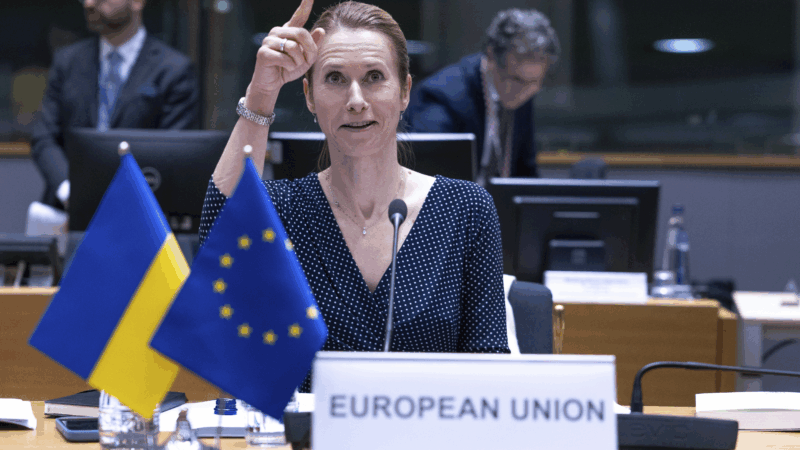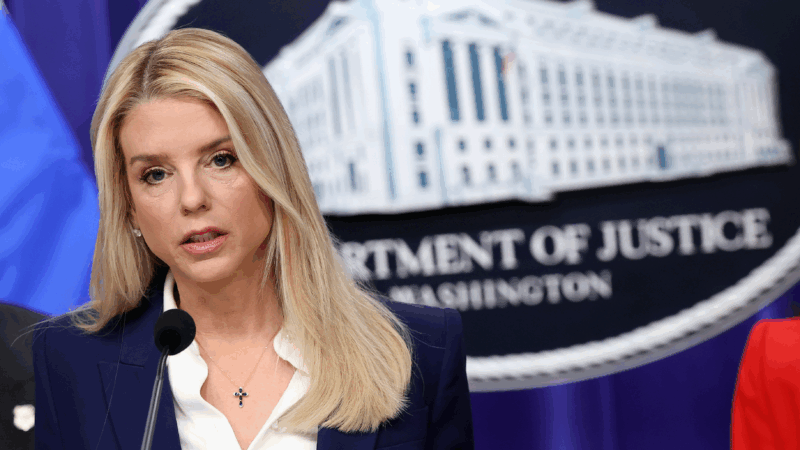Trump tried to shutter Radio Free Europe. The EU threw it a lifeline
The European Union has stepped in to provide Radio Free Europe/Radio Liberty an infusion of millions of dollars to keep functioning as the international broadcaster battles the Trump administration to release funds Congress has already designated for it.
“We are grateful for the emergency funding to help keep Radio Free Europe/Radio Liberty afloat,” the network’s president, Steve Capus, said in a statement from Brussels, where he has been meeting with European officials.
“Radio Liberty’s survival remains at risk as long as these funds are withheld,” Capus said, referring to $75 million held back by the Trump administration.
Radio Free Europe and Radio Liberty were founded in the early 1950s as part of Cold War initiatives to combat Soviet propaganda and influence. They later merged. The news network seeks to provide non-ideological news coverage and programming to countries in Eastern Europe and neighboring states where the press is not able to operate freely.
Last year, more than 47 million unique users relied on its coverage each week in 23 countries, according to the network, including in Russia, Ukraine, the Baltic states, Hungary, Iran and other countries in Central Asia and the Caucasus. The Trump administration initially sought to dismantle Radio Free Europe/Radio Liberty and its sister networks, including Voice of America. His senior adviser, Kari Lake, has called them biased and claimed they served up anti-American fare.
While President Trump has cited a need to identify major budget cuts throughout government, his actions fit neatly into a larger strategy to undermine the news media’s finances and independence.
Actions include executive orders purporting to eliminate federal funding for public broadcasting and purporting to fire board members of the Corporation for Public Broadcasting. Trump’s appointee atop the Federal Communications Commission launched investigations of all major broadcast networks save Fox (owned by Trump’s ally, Rupert Murdoch). And Trump and his allies have filed private civil lawsuits against major news outlets.
Lake, the senior presidential adviser, oversaw the termination of contracts for more than 500 people at Voice of America and its parent agency last week. An appellate court is considering a lawsuit from a coalition of journalists, employees, unions and press advocates who say her actions violate federal law and free speech protections.
The U.S. government withheld monthly payments from Radio Free Europe/Radio Liberty until a federal judge ordered $12 million released. The parent outfit, the U.S. Agency for Global Media, belatedly sent the funds for April. The network is still awaiting its federal payment for May.
On Monday, RFE/RL filed a request for a new temporary restraining order with the court to compel payments for this month. It has also asked for a preliminary injunction requiring the agency to send the network the full $75 million appropriated for the rest of the fiscal year, which ends Sept. 30.
So far, Radio Free Europe/Radio Liberty has put scores of employees on furloughs, canceled contracts with freelancers, and cut back programming.
EU foreign policy chief Kaja Kallas told reporters that it would give $6.2 million to “support the vital work of Radio Free Europe/Radio Liberty.”
“It’s short-term emergency funding designed as a safety net for the [network’s] independent journalism,” she added.
Sweden previously pledged to give $2 million to support RFE/RL’s reporting but those funds have yet to arrive.
“The first thing it says is how much the Europeans value the work that RFE does, and how important they think it is in their news diet and their news ecosystem,” says Rick Stengel, a former U.S. Under Secretary of State for Public Diplomacy under former President Barack Obama.
He points particularly to the network’s reporting on Russia and Hungary and the influence they wield on other European nations. Stengel also tells NPR that this emergency funding crisis suggests a model that could prove more stable moving forward.
“In so many ways, it was a post-World War II and Cold War initiative, which sought to help the European countries which came under the shadow of Soviet domination,” Stengel said. “Now that they’re out from under that, why wouldn’t you even have a consortium of funding for RFE that is a combination of European and American funding?”
Such a solution might make it less reliant on the whim of an unpredictable U.S. administration, he says.
February may be short on days — but it boasts a long list of new books
The shortest month of the year is packed with highly anticipated new releases, including books from Michael Pollan, Tayari Jones and the late Nobel laureate Mario Vargas Llosa.
Shootings at school and home in British Columbia, Canada, leave 10 dead
A shooting at a school in British Columbia left seven people dead, while two more were found dead at a nearby home, authorities said. A woman who police believe to be the shooter also was killed.
Trump’s EPA plans to end a key climate pollution regulation
The Environmental Protection Agency is eliminating a Clean Air Act finding from 2009 that is the basis for much of the federal government's actions to rein in climate change.
Pam Bondi to face questions from House lawmakers about her helm of the DOJ
The attorney general's appearance before the House Judiciary Committee comes one year into her tenure, a period marked by a striking departure from traditions and norms at the Justice Department.
The U.S. claims China is conducting secret nuclear tests. Here’s what that means
The allegations were leveled by U.S. officials late last week. Arms control experts worry that norms against nuclear testing are unraveling.
From gifting a hat to tossing them onto the rink, a history of hat tricks in sports
Hat tricks have a rich history in hockey, but it didn't start there. For NPR's Word of the Week, we trace the term's some 150-year-history and why it's particularly special on the hockey rink.







